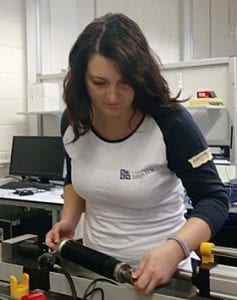Breaking down barriers for tomorrow’s engineers
With ever-increasing demand for skilled engineers, why exclude half of the population? If we want to see more women in our classes, laboratories and lectures, good role models make all the difference. We talked to Dr Hind Saidani-Scott and Dr Irina Lazar about their lives in engineering.
Hind is a senior lecturer in Mechanical Engineering, doing research on solar energy and sustainability. Irina is a lecturer in Mechanical Engineering and in her role as undergraduate programme director, coordinates teaching activities within the department.
What was your favourite toy and what subjects did you like best at school?

At school I was always the best in French and maths until I was 15. Then my favourite subjects switched to mathematics, biology, physics and chemistry and I chose those for my Baccalaureate. I like science subjects because they are logical. You don’t need to learn everything by heart.
Irina: I was a big fan of dolls – I would play with them from morning to evening. I didn’t even have Lego until I started my PhD in Bristol, it was dolls all the way!
As far as school goes, I was always passionate about maths. Anything with numbers seemed quite appealing to me.
Have you ever felt at a disadvantage being female?
Hind: I grew up in Algeria. My first experience of discrimination was the entrance exam for medium school (secondary school). I was top of the class, found the exam very easy and was sure I’d passed but when the results came out, I hadn’t. It was a huge shock. A few months later, a new boys’ school opened and the better male students went there. None of the brightest female students were offered a chance like that, even though the top ten students had been girls. We had to repeat the year before moving up.
A lot of our male teachers were very misogynistic. They’d keep telling us to stop our studies and learn how to run a house instead. Even when I went to university in Algeria, it wasn’t any better. I remember one lecturer decided that no girl student would pass his exam because one of them refused to marry him. We had to take it again!
After university, I did a masters and a PhD in France, at an engineering school. It was a very sexist and racist environment for all Africans but North Africans in particular.

Irina: I come from Romania where my father is an aerospace engineer and my aunt is a civil engineer. So I was always aware that engineering isn’t just for men and that civil engineering isn’t all about working on building sites, for example.
In some ways, there’s more work to be done here in the UK than back at home to encourage women into engineering. There’s an issue with the word ‘engineering’ in the English language. Girls and boys alike don’t really understand what it is, and so small or big stereotypes fill that gap. I’ve been told ‘give it a year in civil engineering and you will look just like a boy’. Another example would be people confusing mechanical engineering with being a mechanic. I get this a lot. I have no idea how to fix a car! That’s why outreach work is so important to me. By showing children what a career in engineering might look like, you can change the narrative. I am also quite a cheerful person and a positive attitude really helps.
What do you like most about your work, what inspires you?
Irina: I didn’t start off thinking I’d become a lecturer or an academic. I wanted to do something practical, something tangible. It’s particularly satisfying for me when I explain something and people understand. I love getting the message across and interacting with students. I learn from them too and keep fine-tuning my teaching style.
I did a masters in civil engineering and I’m still interested in amazing structures. The longest or tallest structures in the world and how engineers push frontiers all the time fascinates me. The Clifton suspension bridge caught my eye when I was considering Bristol for my PhD. The city looked beautiful online – but I never realised there were so many hills! It’s wonderful to be at the heart of such a vibrant community.
Why would having more women in engineering benefit society?
Hind: Women have different ways of looking at things and that alternative view is vital. Besides hard work and sheer luck, having diverse people working together on a project has been key to many of the greatest scientific advances.
Study mechanical engineering
Irina: I think we need to bring everybody to the table and that applies to women and also other minorities. In engineering we’re trying to find solutions to problems and we can’t identify problems that we don’t face ourselves. We need to share our experience. It’s not so much about having a 50/50 split between men and women, but giving all women who’d like to study engineering or other STEM subjects that opportunity, and making them feel welcome, enabling them to succeed.
This year’s theme for International Women in Engineering Day is ‘Shape the World’ – how do you think engineers will do that?
Hind: By developing alternative energies and enabling a drastic reduction in fossil fuel usage. I am hoping that we will make huge progress in solar energy and other cheaper and harmless energies and re-learn to recycle.
Irina: Engineering is breaking down so many barriers already. I think our work on global challenges will probably have the greatest impact. The potential for improvements in health, sanitation and biomedical applications is just amazing.
Top tips for future engineering students
- Take a subject you enjoy. If you’re going to work at something for eight to ten hours a day, whether its for study or a job, it should be something you like doing. Follow your heart. It’s not all about the biggest salaries (although engineering is relatively well paid).
- Engineering is a broad subject that can open many doors. The skills we teach are highly transferrable.
- Enthusiasm is just as important as academic ability.



